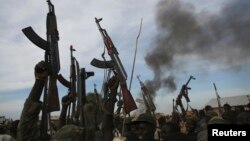More than 50 fighters from both sides of South Sudan's year-old conflict were killed in clashes last week in oil-producing Upper Nile state, the spokesman for the South Sudan army said Wednesday.
SPLA spokesman Philip Aguer blamed the fighting on rebels loyal to former vice president Riek Machar. He said fighting broke out last Thursday in an area northeast of the Upper Nile capital, Malakal, when around 2,000 rebel fighters attacked SPLA bases and positions.
Aguer said government forces repulsed the rebels, but only after fierce fighting. He said that after the clashes, "The SPLA... identified 36 killed on the side of the rebels. The SPLA lost 18 in action and 26 wounded."
He also blamed Machar's rebels for wounding two civilians and a soldier in separate attacks in Bentiu, capital of Unity state.
The military spokesman for the rebels, Lul Ruai Koang, confirmed that there was fighting in Upper Nile state last week but said he had no information about the attacks in Bentiu.
Koang dismissed Aguer's casualty figures for the clashes in Upper Nile.
"These people are fond of exaggerating," he said. "Even when there are no casualties, they just say anything that comes to boost the morale of their fighters.”
Swapping blame
Aguer said rebel attacks on government positions are a violation of the cessation of the hostilities agreement that the two parties signed nearly a year ago. Since the cessation of hostilities agreement was signed last year, the SPLA has said repeatedly that it will not instigate fighting but will retaliate if attacked. Aguer repeated that warning Wednesday.
"SPLA forces are ordered to be on maximum alert and whenever they are attacked, whenever the rebels repeat any attack in Unity State, Upper Nile and Jonglei state, the SPLA will have to pursue them up to where they are launching or organizing their attacks. The SPLA will not be quiet, only receiving blows from left and right,” he said.
Koang denied that rebel forces started the fighting in Upper Nile state. He said the rebels were defending themselves against repeated assaults by groups of pro-government militias.
“We are only allowed by our military leadership to fight in self-defense," he said.
Koang noted that pro-government militias are active in the area where the attacks occurred.
"They keep on attacking our positions and, from time to time, we try to drive them back to their original positions... They come for fresh military supplies in SPLA-controlled areas... It was during one of those occasions that our forces of reconnaissance and their forces of reconnaissance met and exchanged fire. So it is not true that we were the ones who started the fighting,” he said.
Chinese-mediated peace talks
At least 10,000 people have been killed and 1.5 million internally displaced in South Sudan since the country erupted in violence in December 2013. Much of the fighting has been concentrated in Jonglei, Unity and Upper Nile states. Upper Nile and Unity produce most of South Sudan's oil, the source of nearly all of the government's revenues. Jonglei state is believed to also have oil reserves.
Talks mediated by the regional bloc, the Intergovernmental Authority on Development (IGAD), produced a cessation of hostilities deal on Jan. 23 last year but the agreement was violated almost as soon as it was signed.
News of casualties in the latest fighting came days after peace talks led by China ended in the Sudanese capital, Khartoum. South Sudanese officials said the government and rebel sides agreed in Khartoum to accelerate negotiations on forming a transitional government and to work to end hostilities.
On his return from the China-mediated talks on Wednesday, South Sudan Foreign Minister Barnaba Marial Benjamin said the two sides also agreed to allow unobstructed access to the internally displaced, and repeated their commitment to end the conflict and to respect last year's cessation of hostilities agreement.
Marial said the government hopes to resume IGAD-led talks in Addis Ababa with the rebels at the end of January. IGAD adjourned the talks indefinitely last month.
IGAD heads of state will hold a summit meeting on South Sudan on January 30 and 31, to try to finally pressure the government and rebels to end more than a year of conflict. The summit, which was originally scheduled for Jan. 18, was pushed back and will be held on the sidelines of an African Union summit in the Ethiopian capital, IGAD said in a statement Tuesday.
Philip Thon Aleu and Lucy Poni Modi contributed to this report.
